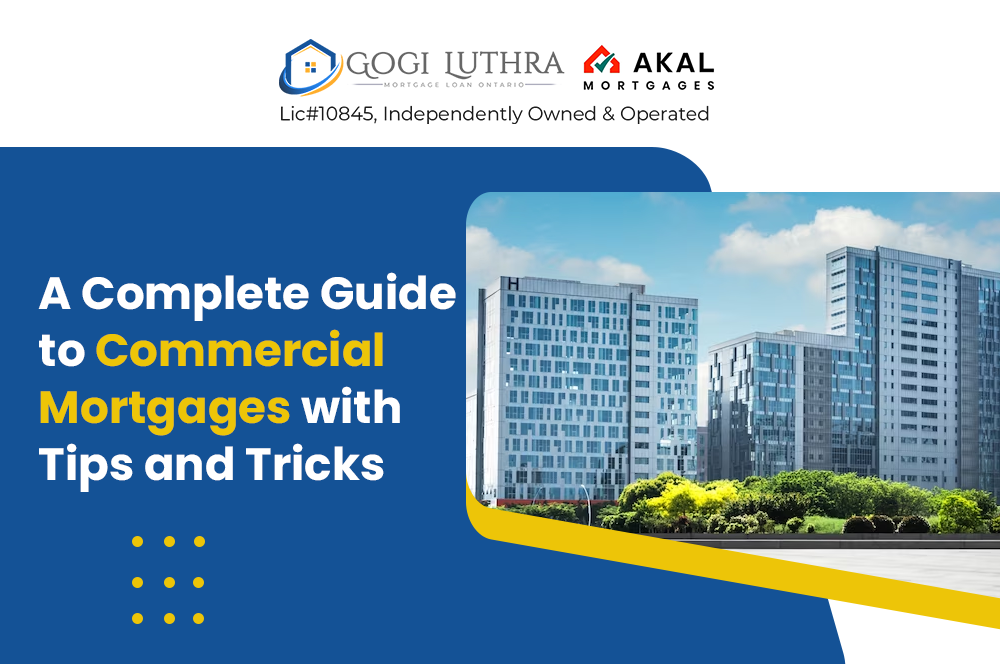Introduction:
In the dynamic landscape of real estate, entrepreneurs and business owners often need financial support to acquire or expand commercial properties. Commercial mortgages emerge as a viable solution, offering a structured approach to securing funding for such ventures. In this comprehensive guide, we will delve into the intricacies of commercial mortgages, providing insights into eligibility criteria, mortgage options, interest rates, loan terms, and the application process. Additionally, we will explore the pivotal role of mortgage brokers in facilitating these transactions.
Establishing Eligibility for Commercial Mortgages:
The journey into commercial mortgages begins with understanding the eligibility criteria set by lenders. Unlike residential mortgages, commercial mortgages involve a more rigorous evaluation process, focusing on the financial health and stability of the business seeking financing. Key factors include:
- Financial Stability: Lenders assess the business’s financial stability by scrutinizing its financial statements, tax returns, and cash flow projections. A track record of profitability and positive cash flow enhances eligibility.
- Creditworthiness: The credit history of the business and its owners plays a crucial role. A strong credit profile increases the likelihood of securing favorable loan terms.
- Property Value and Usage: The commercial property itself is a significant consideration. Lenders evaluate its appraised value, location, and the property’s intended use. Some lenders may have restrictions based on property type.
- Down Payment: Commercial mortgage lenders typically require a substantial down payment. The percentage varies but often falls between 15% and 35% of the property’s value.
Navigating Interest Rates and Loan Terms:
The interest rates and loan terms associated with commercial mortgages are crucial factors that directly impact the overall cost of financing. Borrowers need to navigate these aspects strategically to ensure financial sustainability. Key considerations include:
- Fixed vs. Variable Rates: Borrowers must decide between fixed-rate mortgages, where the interest rate remains constant throughout the loan term, or variable-rate mortgages, where rates may fluctuate based on market conditions. Fixed rates provide stability, while variable rates offer potential cost savings.
- Loan Terms: Commercial mortgages can have varying loan terms, ranging from short-term (1-3 years) to long-term (10+ years). The choice depends on the business’s financial goals, cash flow projections, and the purpose of the loan.
- Amortization Period: The amortization period represents the time it takes to repay the loan amount. While the loan term specifies when the loan must be repaid, the amortization period determines the schedule of principal and interest payments.
- Prepayment Options: Businesses should consider whether the mortgage terms allow for prepayment without incurring penalties. Prepayment flexibility can benefit those aiming to reduce interest costs or pay off the loan early.
Preparing for the Commercial Mortgage Application Process:
The commercial mortgage application process is detailed and requires thorough preparation to enhance the chances of approval. Businesses should be diligent in gathering attestation diligently and presenting compelling lenders. Key steps include:
- Financial Documentation: Prepare comprehensive financial statements, tax returns, and cash flow projections. Lenders use this information to assess the business’s ability to repay the loan.
- Business Plan: A well-crafted business plan provides lenders with insights into the business’s goals, market position, and strategies for success. It should also outline how the commercial property will contribute to the business’s growth.
- Property Appraisal: Lenders often require a professional appraisal of the commercial property to determine its market value. This step ensures that the loan amount aligns with the property’s worth.
- Environmental Assessment: Some lenders may conduct environmental assessments to identify potential risks associated with the property. This is particularly common when the property’s previous use may have left contaminants.
How Mortgage Brokers Can Help:
Navigating the complexities of the commercial mortgage landscape can be challenging, especially for businesses without extensive experience in real estate financing. Mortgage brokers play a pivotal role in simplifying the process and connecting businesses with suitable lenders. Here’s how mortgage brokers can assist:
- Market Knowledge: Mortgage brokers stay abreast of the latest market trends, lender offerings, and financing options. Their knowledge enables them to match businesses with lenders that align with their specific needs.
- Access to Lenders: Mortgage brokers have established relationships with a network of lenders, including traditional banks, credit unions, and alternative financing sources. This access expands the range of options available to businesses.
- Negotiation Skills: Brokers leverage their negotiation skills to secure favourable terms on behalf of their clients. This includes obtaining competitive interest rates, favorable loan terms, and flexible repayment options.
- Streamlining the Process: The commercial mortgage application involves extensive paperwork and coordination. Mortgage brokers simplify this process, ensuring that all documentation is in order and submitted promptly.
- Expert Guidance: With their expertise in commercial financing, mortgage brokers provide valuable guidance to businesses. They help clients understand the implications of various loan options and make informed decisions.
Conclusion:
Commercial mortgages offer a pathway for businesses to acquire, expand, or develop commercial properties, contributing to their growth and success. Understanding the eligibility criteria, exploring diverse mortgage options, and navigating interest rates and loan terms are critical to securing favorable financing.
The meticulous preparation for the application process and the assistance of mortgage brokers further enhance the likelihood of success in obtaining a commercial mortgage. As businesses continue to evolve, the strategic utilization of commercial mortgages becomes a key tool for unlocking new opportunities in the ever-changing real estate finance landscape.
If you are also searching for a commercial mortgage solution, call us at +1 416-262-8937. Our team will guide you in choosing the best option for your needs.

